Last year, before I journeyed to Canterbury for the Lambeth Conference, I wrote of my low expectations for that every-ten-year gathering of the Anglican Communion’s bishops. Upon my return, I reported in sadness how it had lived down to my expectations.
In truth my expectations for the every-three-year General Convention of the Episcopal Church – our 76th – were not much higher. Indeed, given the tension and, among some, anger surrounding BO33, a 2006 resolution promising “restraint” on same-sex unions and the consecration of gay bishops, and the threats since by the Archbishop of Canterbury concerning our membership in the Anglican Communion, I was not the only one who feared an explosion of one sort or another this July in Anaheim.
That explosion never occurred. Instead, both the House of Deputies and House of Bishops passed by overwhelming majorities of two-to-one a positive, forward-looking resolution – DO25 – that allowed BO33 to fade into the mists of a fearful past, boldly stated the inclusive truth of the current consensus within the church, and charted a course for moving forward in continuing fealty to the Anglican Communion.
Against that background, the goals and expectations of the transgender community, of which I am a member, paled in comparison. As we gathered two blocks from Disneyland, we probably were not even on the horizon of most deputies and bishops. The hope of our nascent transgender organization – TransEpiscopal – was simple and modest. Of the four trans-specific resolutions originally submitted, our hope was that one would make it to the floor of the House of Deputies where discussion of it would lead to recognition of our existence and begin an education process around the issues that confront us on a daily basis.
Our little team of eight, embedded in the larger and very supportive Integrity team, succeeded, however, beyond our wildest dreams.
What follows is my attempt to chronicle what happened and to describe my feelings as events unfolded and, now, in their warm afterglow.
PUTTING TOGETHER A TEAM AND A PROGRAM
This adventure started for us in the chill of February. Communicating through the spring by e-mail and conference calls, we tracked the several resolutions being submitted by dioceses and obtained the support of non-trans allies such as Sarah Lawton and Byron Rushing, coordinated our efforts with key LGBT advocacy groups such as Integrity and the Consultation, produced a brochure to hand out at convention and elsewhere, raised money, divided up tasks at convention, and steeled ourselves for the unknown.
And there was a lot that was unknown, for this would be the first time that there would be a visible, vocal transgender presence at a general convention. Would anyone notice? Would anyone care? Would there be a hostile backlash?
There were eight of us and we were, despite our common cause, amazingly diverse. We were five trans women, two trans men, and a gay male ally; three priests, one deacon, and four lay people; and one of our number, Dante Tavalaro, a 19-year-old layman, would be the first trans deputy in the House of Deputies. We hailed, moreover, from every corner of the country – Massachusetts, Rhode Island, Connecticut, Maryland, Michigan, Wisconsin, and, yes, California – and spanned the age spectrum from nineteen to seventy.
We also brought to the task a variety of skills that included expertise with computers and audio/visual equipment, writing, editing (the New York Times no less), and labor organizing. Leadership flowed rather naturally to The Rev. Cameron Partridge, a Massachusetts priest, ably assisted by Donna Cartwright, the editor/organizer from Baltimore and The Rev. Michelle Hansen, a retired priest from Connecticut. All three had been at earlier conventions and educated the rest of us on the ins and outs of the sometimes arcane legislative process.* Cam and I had also shared the experience of Lambeth last year and, with Michelle, the Pacific School of Religion’s Transgender Religious Summit in Berkeley the year before.
And so we left our homes and families, telling our friends: “I’m going to Disneyland!”
HITTING THE GROUND RUNNING
Our arrivals were only slightly staggered with all of us on the ground for the start of the convention. The only one to drive, I arrived about 7:00 p.m. on Tuesday, July 7, joining up with the others between an ongoing meeting of the National and International Affairs Committee (which had two of our resolutions) and a regular 10:00 p.m. meeting of the Integrity team. The latter, a Lambeth reunion of sorts, was followed by the first of a dozen or so meetings of our TransEpiscopal team.
At that first meeting, we divided assignments for testimony before the two committees that would be hearing our resolutions. The World Missions Committee would, we learned, consider our resolutions on Canon revisions opening up access to the ordination process to the transgendered (i.e., prohibiting exclusion of the basis of gender identity or expression)…and it would do so at 7:30 the next morning.
Getting back to my Travelodge room around midnight, I scribbled some notes on a yellow legal pad and, falling into a bed that would become familiar, enjoyed the sleep of exhaustion.
Four of us testified the next morning – Wednesday. It was the first act in a whirlwind of sixteen-hour days that soon became a blur – 7:00 a.m. committee meeting, bagel, 9:30 House of Deputies and House of Bishops meetings, Eucharist, a hot dog in the exhibit hall food court, 2:00 p.m. meetings of the two houses, 7:00 p.m. committee meeting, a veggie Panini at the Courtyard, 10:00 p.m. Integrity team meeting, 11:00 p.m. TransEpiscopal meeting to lay out plans for the next day. For Cameron, who also had responsibilities with Integrity and the Consultation, whilst all the while blogging non-stop, the schedule was even more intense.
In the “breaks,” there were opportunities to lobby potential allies, to meet folks at the Integrity booth, to make new friends, and to just soak in the Spirit that permeated the place, the people, the proceedings. Whatever exhaustion had crept in evaporated in the growing exhilaration. Running into House of Deputies President Bonnie Anderson between meetings, I could honestly answer “Yes!” – to which I added a hug and a “Thank you” - when she asked “Are you having fun?”
And it soon became apparent that our decision to be in place for the start of convention was a wise one, for it was a very much front-loaded affair with regard to the resolutions we had put forward. Already the second morning, for example, we found ourselves testifying before the National and International Affairs Committee which had on its plate our resolutions on hate crimes and employment non-discrimination. The next mornings and evenings were devoted to following the discussion of the resolutions by the two committees.
Chaired by Bishop John Chane of Washington and including around the table familiar faces like Integrity’s Louie Crew and California’s Sarah Lawton and Bishop Marc Andrus, the National and International Affairs Committee seemed the more simpatico of the two groups. It was an impression reinforced by the nods and smiles that greeted our testimony. Despite a mild hiccup concerning the addition of “disability” to the list of protected classes in the resolutions under consideration and the perception of some that that might imply that LGBT people suffered from some disability, both resolutions passed with overwhelming majorities.
It was also clear that the World Missions Committee was an unlikely one to be asked to consider BO33 and our transgender resolutions. The rationale for the assignments seemed to be that BO33 related to relations with the Anglican Communion and that transgender issues related to BO33. That said, some members of the committee found their task awkward and unfamiliar and an early attempt was made to fob off our resolutions to the Commission on Canons…a move that would have been very understandable. The Chair, Gay Jennings, pointed out, however, that to do so would mean bumping our trans issues to the end of the line of a long list of issues facing Canons and losing them in the rush of last minute business as they were in 2006. “We have been dealt these issues,” she insisted, “and it is up to us to deal with them.”
And deal with them they did…in a movingly thoughtful and spiritual manner. There was, to be sure, considerable misunderstanding about what it means to be transgendered and the difference between gender identity and sexual orientation. One bishop, for example, objected that there was no need for our resolution CO61, since “Sexual orientation is already in the canon.” In response, Ian Douglas gave one of the clearest explanations of the differences between identity and orientation, stressing the relational aspect of the latter. (Thanking him two days later, I added that even I, a transgendered person, had learned from what he said.)
Bottom line, the resolution passed 19-8 among the deputies, with the four bishops voting “No,” and, indeed, was strengthened by adding upfront words to the effect that all are welcome.
As our team drifted out into the hallway to take a celebratory breath and plan next steps, we were joined by the committee’s Michael Barlowe, tears behind his eyes, who spoke of how the Spirit had moved in the room we had just left. He then relayed a request from the chair for a list of authoritative definitions that could be handed out in the House of Deputies and a brief statement she could make in presenting the resolution to the House. We readily agreed to take on the task. In the course of the next hours, our Donna Cartwright obtained from Lisa Motet of the Washington office of the National Lesbian and Gay Task Force a list of definitions on NLGTF letterhead and Cameron Partridge produced the desired statement. With a helpful addition by Michael Barlowe, it was used by Gay Jennings in introducing the resolution.
Entering the third day, we had already exceeded our pre-conference goals – three resolutions would make it to the floor of the House of Deputies and two more, introduced by Dante Tavolaro, were wending their way through the committees. The latter concerned non-discrimination in the hiring of lay employees and making ordination forms less gender particular. Time to take a deep breath, savor the moment, and prepare to track what we had wrought.
THE SPIRIT TAKES WING
Literally! Taking a seat for the first time in the visitors’ gallery of the House of Deputies, I was amazed by the solitary pigeon (aka dove) that hovered over the deputies, continuing to fly about the hall the next several days. And, it became clear, the Spirit was stirring not only above, but within the deputies.
First came the overwhelming 2-1 vote for DO25, the action on which then moved to the House of Bishops. Meanwhile those of us in TransEpiscopal awaited in tense anticipation the introduction in the House Deputies of our trans-specific resolutions, the first of which would be DO12 on hate crimes legislation. We waited and waited…and waited through the afternoon of Monday, July 13. Getting the impression that it would not be brought up till the next morning and hearing that the bishops were in the midst of the historic debate on DO25, Donna and I made our way upstairs to the House of Bishops…arriving just in time to hear the impassioned intervention of Rochester’s Bishop Singh who spoke of how the church had been planted and prospered in India among the untouchables, the outcasts. Soon thereafter the vote began. Of all the votes, the one that rang clearest to my ears was the crisp, unwavering “Aye!” of the Presiding Bishop.
The deed was done, the final vote being 99-33. It was as if a festering boil had been lanced. One could feel the tension, the fear, the pain leave the room, leave the church. The doors opened and the people rushed out, too, making their way – in silence – down the long, steep escalator. Bishop Steven Charleston and I shared a silent, smiling high five as he stepped onto its moving corrugated metal.
Making my own way down to the lobby, I made my way back to the House of Deputies, there to learn that our resolution DO12 on hate crimes and violence had made it to the floor and that Dante, Sarah Lawton, and Michael Barlowe had spoken movingly on behalf of it, as had several others. While the omens were good, the vote had been taken by orders and the results, therefore, would not be made known till the next morning.
Sarah, Michael, and other members of the California delegation were in the midst of an impromptu celebration at the back of the hall. It was a moveable feast that made is way through the lobbies of the Convention Center and Hilton and up a freight elevator to Bishop Marc’s seventh floor hospitality suite. From there I caught a glimpse in the distance of Disneyland and its Matterhorn – as close as I would get – as the celebrating gave way to planning the next day’s and, indeed, the evening’s legislative work.
For my part, I had planned to leave first thing the next morning to begin my journey home by way of a visit with my mother-in-law in Ojai. I could not, however, leave without returning to the House of Deputies the next morning to learn the vote. DO12 passed overwhelmingly! The tears welled up. Getting up to leave, I was exchanging farewell hugs with my transgender sisters and brothers, when Dante and World Missions Chair Gay Jennings rushed from the floor to join us. Squeezing out a feeble “Thank You,” I turned and walked through a now silent lobby and, stopping only long enough to share my joy with three new deacons, traced a well-worn path to the Travelodge…my car…and home.
I was home a day on Friday when I got the telephoned news from Cam that the bishops had passed DO12 following what Episcopal Life called a “lively debate” – a debate that included supportive statements by Cam’s Bishop Tom Shaw and my Bishop Marc Andrus.
At home I also learned that our resolutions on ENDA, on non-discrimination in the hiring of transgedender lay employees, and on making church forms more trans-friendly had also been approved with flying colors. I learned, however, that there had been a long and contentious debate about changing Canon III concerning ordinations (our original CO61). The bishops could not bring themselves to add gender identity or expression to the list of classes that could not be excluded from the ordination process. Instead, by a very split vote, they eliminated any mention of any specific group and bounced back to the World Missions Committee and thence to the House of Deputies a resolution that opened the ordination process to “all baptized Christians.” With TranEpiscopal’s support, that was voted down in the House of Deputies in the hope that three years hence, after further education, we might succeed in getting “gender identity or expression” added explicitly to the canon.
Despite this last minute disappointment, we succeeded in getting four trans-important resolutions passed and the canon change is now on our horizon and the bishops’ radar screens. Above all we incarnated an otherwise abstract issue and educated a broad spectrum of the church about the reality of our lives. I have little doubt that, by continuing a visible presence in the councils of the church and ramping up our education efforts, we will, three years hence in Indianapolis, complete the job of fully including transgendered people in the life of the church.
A SPECIAL EUCHARIST
This has been an important, inspiring start for TransEpiscopal and, as we look forward to Indianapolis and beyond, it is worth noting a little noticed Eucharist held in a small Integrity meeting room at the Courtyard Marriott the evening of Saturday, July 10.
Seeking to mark the departure the next morning of one of our team members Gari Green, we decided to hold a first Transgender Eucharist at General Convention. We were encouraged by our Integrity allies, especially Jim Toy, who recalled the first Integrity Eucharist in 1988 attended in just such a room by a handful of people.
And so we gathered – about twenty of us. Gari, assisted by Cam and Michelle, presided, I served as deacon, and Donna read the first lesson. In lieu of a sermon, everyone in the room reflected on the experience of the previous few days and the importance of what had already transpired to their own spiritual lives and to that of the church. We then formed a circle and passed the bread and cup to each other…one bread, one cup, one family.
Of all the splendid Eucharists that graced convention, including the Integrity Eucharist that had grown to 1,500 people, this was the one I will remember most. It is a memory I have carried home and will carry with me the rest of my life. It is a special memory of a time and place in which our lives became more fully a part of the life of the church and an earnest that that communion will become fuller still.
- the Rev'd Deacon Vicki Gray
*actually, in 2009 only Donna Cartwright had been to a previous General Convention (2006)

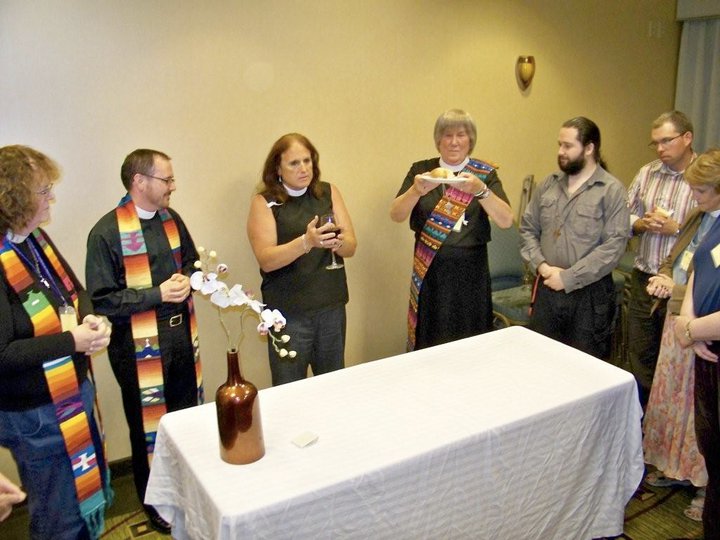
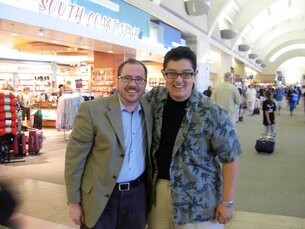
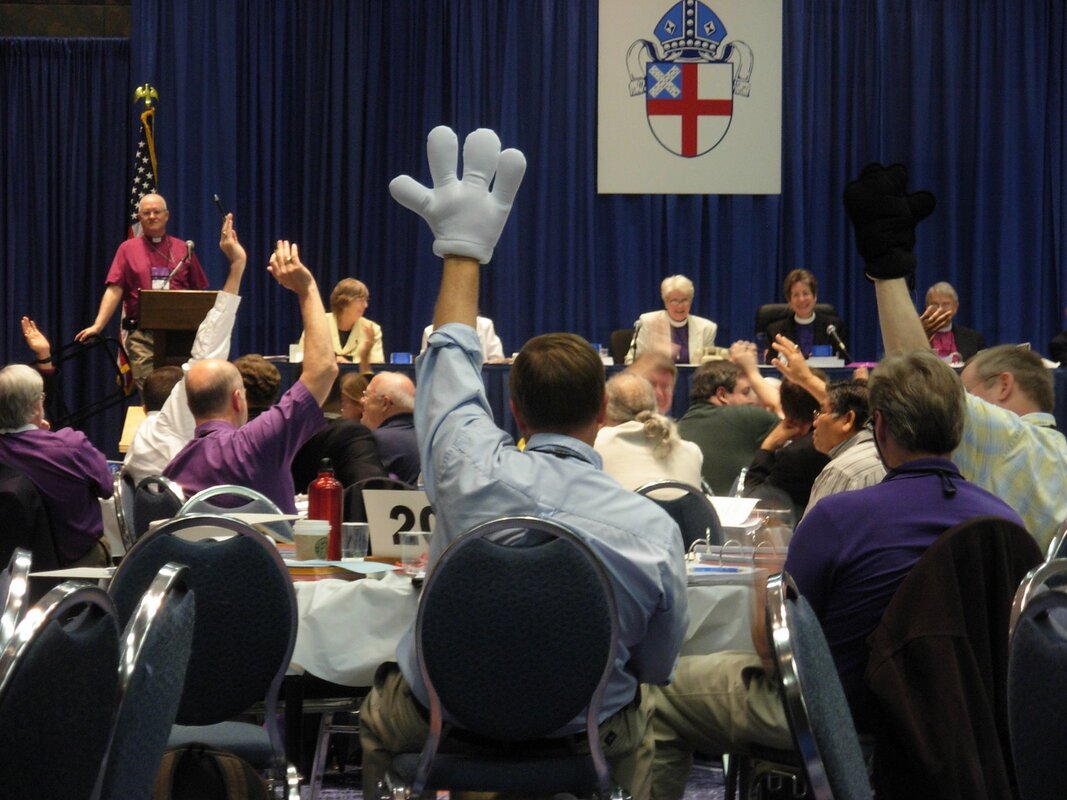
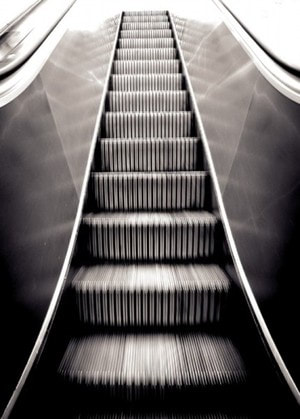
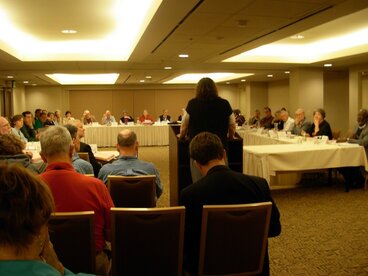
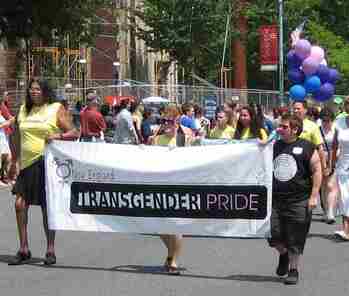
 RSS Feed
RSS Feed